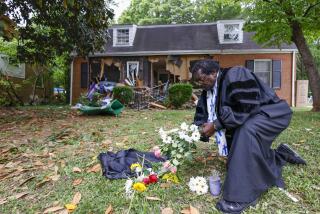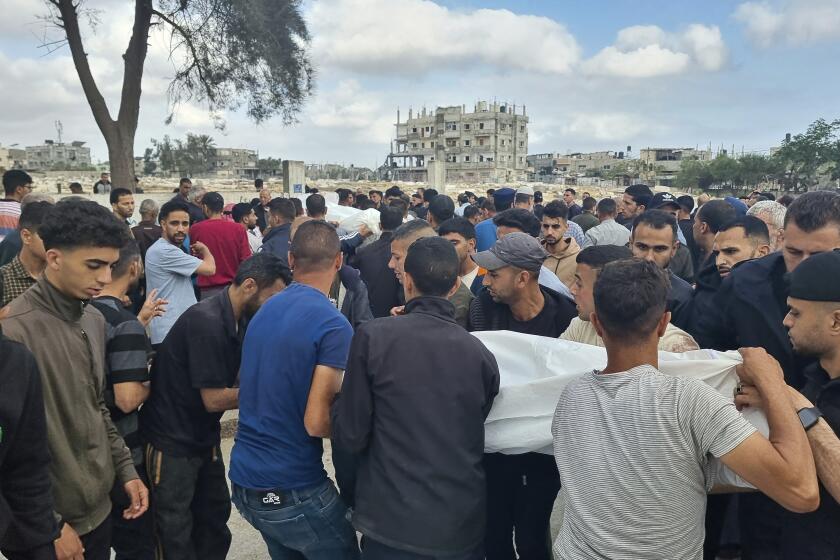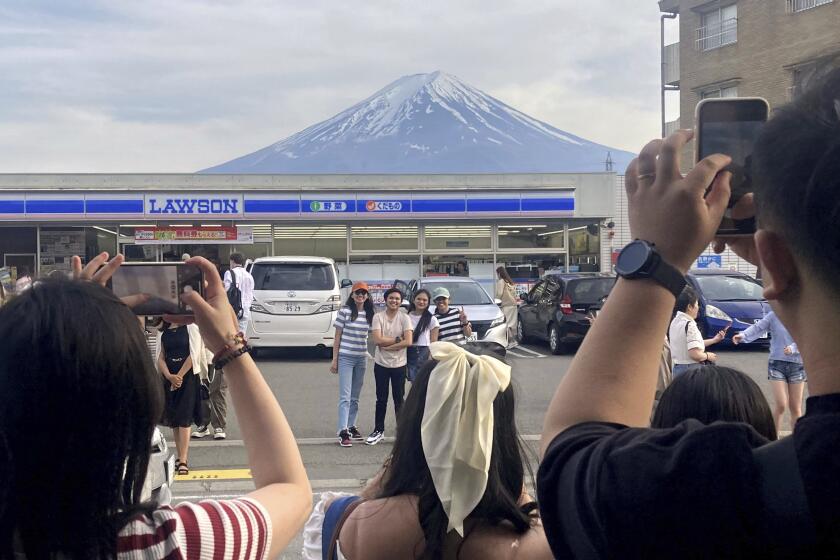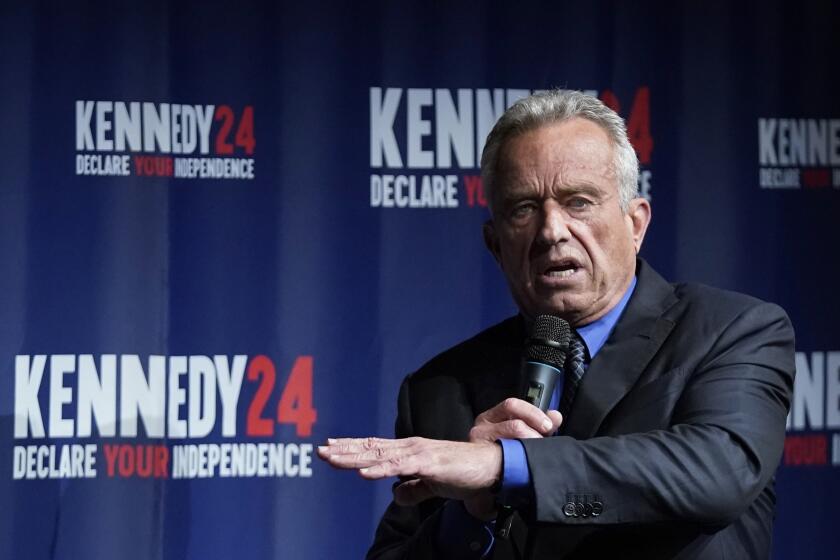In Iraq, a Case Without Precedent
Fourteen months after Saddam Hussein was found cowering in his spider hole, the Iraqi tribunal set up to judge him and 11 of his top associates on mass murder and genocide charges is getting ready to hold its first trials.
In the glare of world opinion, the court will be on trial, too.
Few dispute the role of Hussein and his cohorts in the deaths of tens of thousands of Iraqi Kurds and Shiites. But many have questioned whether a court created under foreign occupation and held inside Iraq in the midst of an insurgency will be able to give a fair and universally accepted verdict.
International human rights experts insist they want the tribunal to succeed but question whether the court, as currently constituted, will be up to the task. Some argue that there is still time to move the trials to another country and operate them under an international mandate.
“I think it is going to be a challenge, I really do,” said Richard Dicker, director of international justice at Human Rights Watch, an advocacy group in New York.
Dicker and other human rights experts are concerned about the decision to use the death penalty, unclear rules of evidence and what they see as the accused’s inadequate access to their lawyers. They also see an overall lack of transparency in the proceedings and question whether the Iraqi judges have the experience to handle such far-reaching cases.
“There was no independent judiciary in Iraq for 30 years, and these are among the toughest legal challenges for judges and lawyers anywhere to take on,” Dicker said.
The dangers faced by court personnel were shown Tuesday, when gunmen attacked and killed investigating Judge Barwez Merwani and his lawyer son Aryan outside their Baghdad home. Merwani was the first member of the tribunal to be assassinated, but a Western legal expert said court employees have faced numerous threats.
“If the judges are going to be killed if they sit in Iraq, then they’ve got to sit elsewhere,” said Geoffrey Robertson, a British queen’s counsel and expert in international justice who headed the first U.N. war crimes trial in the African nation of Sierra Leone. “You can’t have justice in a war zone.”
Speaking after the assassination, he said it was now plain that the new government, when it sits, must agree to move the trials out of the country and reconstitute the court as an international tribunal with U.N. sanction. “There’s a narrow window of opportunity,” he said.
The Iraqi Special Tribunal comprises about 35 specially appointed Iraqi judges and a workforce of 400 that includes lawyers, investigators, researchers and bodyguards. Advised at every step by U.S., British and other international lawyers, members of the tribunal have had to work behind closed doors, sifting through tons of documents and thousands of potential witnesses to address alleged crimes of the Baathist regime that took place over four decades.
The judges and staff remain largely anonymous. Even the site of the planned trials has not been announced, although officials have said privately that a special courthouse was being constructed inside one of Baghdad’s high-security zones.
On Monday, the first charges prepared by the tribunal’s investigating judges were referred to trial judges. They involved five of Hussein’s former lieutenants, including his half-brother Barzan and former Vice President Taha Yassin Ramadan. They were accused of a series of mass killings in 1982 against an Iraqi village in central Iraq where there had been an assassination attempt on Hussein.
Other defendants believed likely to face trial soon are Hussein’s cousin Ali Hassan Majid, better known as Chemical Ali, for his role in poison gas attacks against Iraq’s Kurdish minority, and former Defense Minister Gen. Sultan Hashim Ahmad Jabburi Tai. Both were called to appear at preliminary hearings in December. Their testimony might be used to build the case against Hussein, whose first trial might not take place for a year.
The U.S. military transferred the 12 defendants to formal Iraqi custody June 28, the day sovereignty was given to an Iraqi interim government, but they remain under heavy guard by U.S. troops in a prison near the Baghdad airport.
Unlike the Nuremberg trials after World War II or the special tribunals for Bosnian and Rwandan war crimes, the Iraqi tribunal will not be international; it will operate under Iraqi law.
Defense lawyers allege that the tribunal, established in December 2003 by the Coalition Provisional Authority and its appointed Iraqi Governing Council, violates Geneva Convention rules that limit what occupying powers are allowed to do.
“The tribunal is illegitimate, illegal and unconstitutional, because it was established by Paul Bremer,” said one of Hussein’s lawyers, Khaleel Duleimi, referring to the former chief U.S. administrator.
Speaking to The Times last week by telephone from a place of hiding, Duleimi said he had received anonymous death threats for his decision to defend Hussein and had to leave home for safety. He said that the defense team, based in Jordan, intended to put the prosecution on trial and also challenge the legality of the war that had ousted Hussein.
The tribunal’s defenders say that the court has been advised but not controlled by the U.S. government and that such concerns will be wiped away as the court will likely be reconfirmed by the new Iraqi government.
Former U.S. Atty. Gen. Ramsey Clark said the Iraqi tribunal lacks basic rules of fairness, declaring that its “concept, personnel, funding and functions ... were chosen and are still controlled by the United States, dependent on its will and partial to its wishes.”
Clark is a war critic who frequently takes up unpopular causes and has volunteered to help defend Hussein. But U.N. Secretary-General Kofi Annan also has expressed other reservations. Not wanting the world body linked to trials that could bring death penalties, Annan forbade any direct participation by the U.N.’s war-crimes tribunal at The Hague in helping to train the Iraqi lawyers and judges.
In a country seen by many as on the verge of civil war, the trials -- and death sentences for the defendants -- could spark more violence if the formerly dominant Sunni Muslim community perceives the tribunal as a kangaroo court or if testimony serves to rally disaffected former Baath Party members.
With elements of Hussein’s Baath Party believed to be leading the insurgency, the trial is also seen as a political necessity for the still-fragile U.S.-backed government.
Veteran opponents of Hussein, like Ahmad Chalabi, the leader of the Iraqi National Congress, argue that the new Iraqi government will be able to establish its authority and move forward after Hussein’s crimes are aired in a public trial and the law is allowed to mete out a just retribution.
“I want to get the trial going. This is a unifying thing,” said Chalabi in a recent interview. He blamed delays on members of Hussein’s party, who he said had been allowed to infiltrate the tribunal.
Many ordinary Iraqis are impatient for the trial of Hussein to begin.
“If it was up to me, I would slice him to pieces and then eat him,” said Hamdi Ali, 26, a seller of cloth in Baghdad. He agreed that Hussein should have a trial, but had no doubt about the eventual verdict. “He should not be killed immediately, because that would be too easy. He should be put in prison for years, taste the humiliation, and then his punishment should be cutting him up into pieces.”
Hussein’s lawyer, Duleimi, said he had met with his client once, for 4 1/2 hours, on Dec. 16 and said he found the former leader cut off from the news of the world but in fair health and eager to go to trial. Hussein passes the time working on books and poetry, reading the Koran and praying, the lawyer said. “His spirit was very high. The Americans are not troubling him. His food is good. His drink is good. His clothes are normal.”
Duleimi said that Hussein had already been proved innocent of the prewar accusations that he possessed weapons of mass destruction that led to the U.S.-led invasion, and therefore other charges that followed from that “illegal” action should not be allowed.
“Everything based on unrighteousness is null and void,” he said.
Michael P. Scharf, an international law professor at Case Western University in Cleveland, said he had started out as a skeptic about the tribunal, convinced “it would be perceived as a puppet court.” But after assisting in training some of the judges in October in London, he said, he came away impressed by the determination they showed to conduct fair proceedings consistent with international standards.
“Each thing I learned convinced me more and more that they are doing the best they can with a tough situation,” he said.
Scharf said an international trial had not been possible to organize because the crimes that the tribunal would address took place from 1968 to 2003, and most of that period would have been outside the mandate of the United Nations’ International Criminal Court. Opposition from certain Security Council members would have blocked an ad hoc tribunal such as the Rwandan and Bosnian courts, he said.
Nevertheless, he said the tribunal has been studying the work of international courts and is getting “a tremendous amount of international assistance,” including the training by international jurists in London and courtroom rehearsals in Italy and the Netherlands. They are also amending Iraq’s rules and procedures to exclude evidence obtained under coercion, he said.
Scharf said Iraqis, not the Americans, insisted on keeping the death penalty in place, even though it would be controversial in many countries. The judges have also insisted that their own faces will not be covered during trials, in spite of the personal danger to themselves.
“They want to televise it, which is interesting,” he said of the judges on the tribunal. “They really think that justice has to be seen as fairly done, and they want the Iraqi people to see justice fairly unfold.”
Dicker, of Human Rights Watch, said one controversial issue involved how much evidence defendants would be allowed to introduce to rebut the allegations against them.
For example, “how much evidence will be let in in terms of U.S. government involvement and knowledge in 1987 to 1988 of Saddam Hussein’s use of poison weapons against the Kurdish population ... or the Iranian population?” he asked.
The worst thing, he said, would be “some kind of fantasy political show trial.”
“In sending the signal that it is not business as usual from the old Baathist regime, these trials are symbols, and that is why we want to see them succeed,” he said. “But to succeed, they need to adhere to international fair-trial standards.”
*
(BEGIN TEXT OF INFOBOX)
Regime on trial
Saddam Hussein and at least 11 other high-profile detainees will be tried on mass murder and genocide charges. Hussein’s case isn’t expected to go to trial until at least late 2005.
*
The first charges
Hussein’s half-brother Barzan, former Vice President Taha Yassin Ramadan and three others are charged in a case stemming from an incident on July 8, 1982, when Hussein’s motorcade was fired on by a group of villagers in Dujayl, north of Baghdad. More than 140 people were allegedly executed and about 1,500 imprisoned.
*
Iraqi Special Tribunal
Established Dec. 20, 2003, by order of L. Paul Bremer III, head of the Coalition Provisional Authority, based on a statute passed by the Iraqi Governing Council.
1. Investigative phase:
Consists of 20 permanent judges and 10 reserve judges, assisted by attorneys and researchers who investigate allegations, collect evidence and compile dossiers against suspects that become the basis for the trial panelsO hearings.
In progress for more than a year. Dossiers are nearing conclusion.
2. Trial panels:
Two chambers consisting of five judges each who hear cases and reach decisions by majority vote.
A prosecutor and defense attorneys are present, but unlike in U.S. courts, judges take the leading role in calling and questioning witnesses and weighing evidence.
3. Court of Appeals:
Nine judges, who then elect one of their number as president.
*
Source: Times reporting
Zaynab Hussain of The Times’ Baghdad Bureau contributed to this report.
More to Read
Start your day right
Sign up for Essential California for news, features and recommendations from the L.A. Times and beyond in your inbox six days a week.
You may occasionally receive promotional content from the Los Angeles Times.






